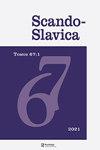From the editor
IF 0.1
0 HUMANITIES, MULTIDISCIPLINARY
引用次数: 0
Abstract
The present issue of Scando-Slavica offers readers seven articles and three book reviews. The topics addressed by the contributors include contemporary Russian transcultural prose, works by Aleksandr Puškin, Marina Cvetaeva, and Olga Tokarczuk, as well as contemporary Macedonian grammar, Slavic historical grammar and Balto-Slavic accentology. Andrey E. Bochkarev’s article brings a close reading of Aleksandr Puškin’s short story Metel′ (The Snowstorm), showing how a small detail, the motto Ut duo unum componant, plays an important role in the narrative. Eleni Bužarovska discusses the reintroduction in standard Macedonian of the potential mood marker bi-. The spread of the bipatterns, which, it is argued, entered the Macedonian conditional system under the influence of neighboring Slavic languages, is investigated through the analysis of examples from literary works from different periods. Anna Ljunggren discusses contemporary Russian literary guidebooks as an important hybrid genre with simultaneously informative, autobiographical and historiosophic functions. By analysing works by Joseph Brodsky, Andreï Makine and Michail Šiškin, Ljunggren shows how transcultural writing can include a particular fusion of pragmatic and aesthetic aspects. Marek Majer analyses the origin of the Proto-Slavic abstract suffix *-ostь, proposing a reconstruction of a class of adjectives in *-ostъ (< *-osto-), which has not been directly preserved as such but which has parallels in other Indo-European languages. Ellen Mortensen explores the theme of revenge in Olga Tokarczuk’s novel Drive Your Plow Over the Bones of the Dead. The plot structure and the characters are analysed from an ecofeminist perspective, showing how the powers of nature play a crucial role in the development of the story. Yulia Pasko studies Marina Cvetaeva’s poetic cycles Achmatova and Poems for Blok, analysing the spatial organisation of the texts through Michel Foucault’s concept of heterotopia as interpreted by Rainer Warning. Vytautas Rinkevičius’ contribution to the ongoing discussion of the origin of the Balto-Slavic mobile accent paradigms reveals how the Lithuanian dialectal Žemaitian accent retraction presents important typological parallels to proposed reconstructions of early Baltic and Slavic accent developments.来自编辑器
本期《斯拉夫丑闻》为读者提供了七篇文章和三篇书评。撰稿人讨论的主题包括当代俄罗斯跨文化散文、Aleksandr Puškin、Marina Cvetaeva和Olga Tokarczuk的作品,以及当代马其顿语法、斯拉夫历史语法和巴尔托斯拉夫口音学。Andrey E.Bochkarev的文章细读了Aleksandr Puškin的短篇小说《暴风雪》,展示了一个小细节,即格言Ut duo unum compnant,如何在叙事中发挥重要作用。Eleni Bužarovska讨论了在标准马其顿语中重新引入潜在的情绪标记bi-。有人认为,在邻近斯拉夫语言的影响下,双模式语进入了马其顿条件体系,通过分析不同时期文学作品中的例子来研究双模式语的传播。Anna Ljunggren讨论了当代俄罗斯文学指南作为一种重要的混合类型,同时具有信息性、自传性和历史性的功能。通过分析Joseph Brodsky、AndreïMakine和MichailŠiškin的作品,Ljunggren展示了跨文化写作如何包含语用和美学方面的特殊融合。Marek Majer分析了原斯拉夫抽象后缀*-ostă的起源,提出了对*-ostõ(<*-osto-)中的一类形容词的重建,该形容词没有直接保存下来,但在其他印欧语言中有相似之处。Ellen Mortensen在Olga Tokarczuk的小说《把犁开过死人的骨头》中探讨了复仇的主题。从生态女性主义的角度分析了故事的情节结构和人物,展示了自然的力量如何在故事的发展中发挥着至关重要的作用。Yulia Pasko研究了Marina Cvetaeva的诗歌周期《Achmotova》和《Blok的诗》,通过Rainer Warning解释的Michel Foucault的异托邦概念分析了文本的空间组织。Vytautas Rinkevičius对正在进行的关于波罗的海-斯拉夫移动口音范式起源的讨论的贡献揭示了立陶宛方言的日美提口音回缩如何与早期波罗的海和斯拉夫口音发展的重建提出了重要的类型学相似之处。
本文章由计算机程序翻译,如有差异,请以英文原文为准。
求助全文
约1分钟内获得全文
求助全文

 求助内容:
求助内容: 应助结果提醒方式:
应助结果提醒方式:


